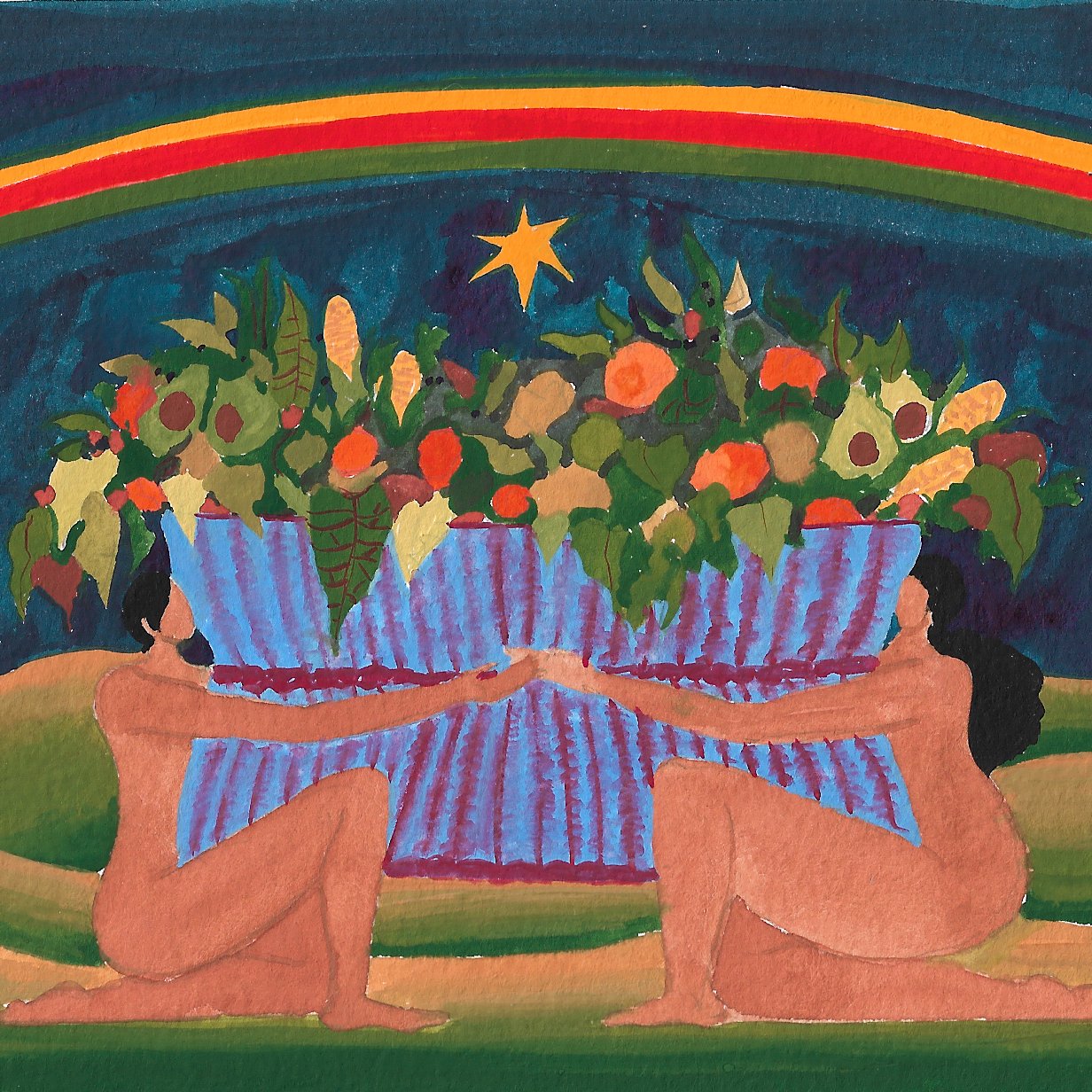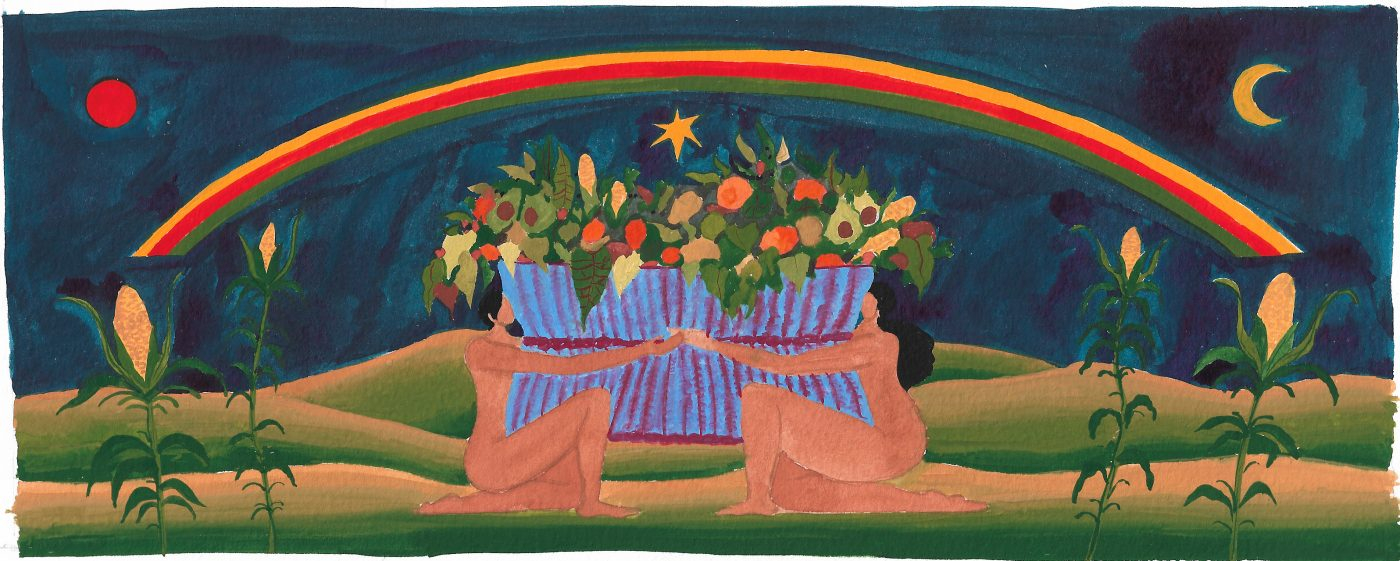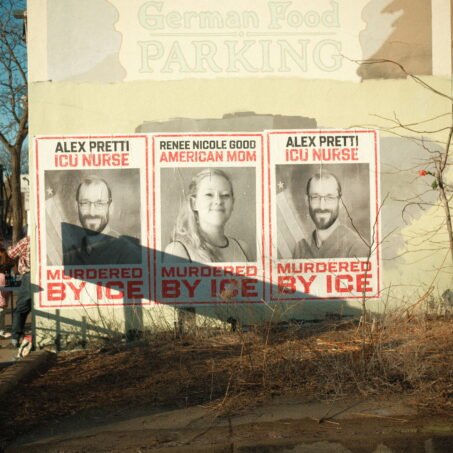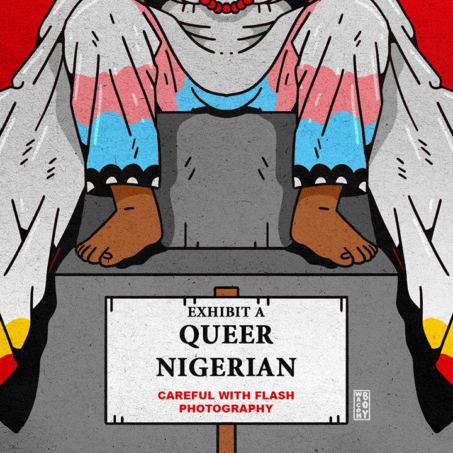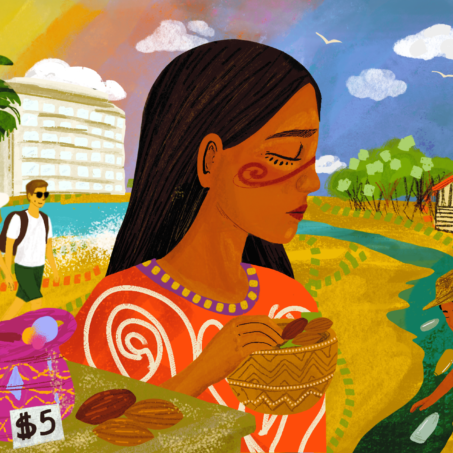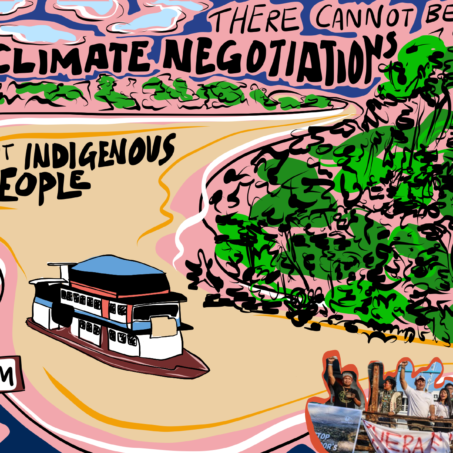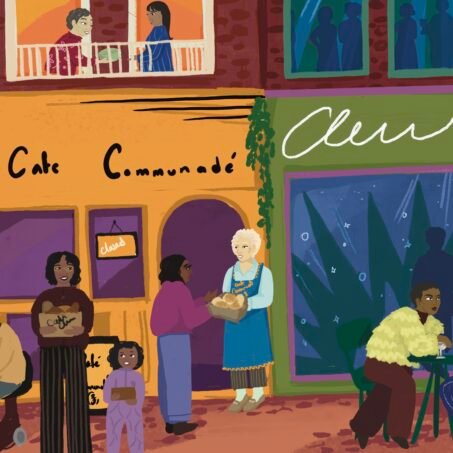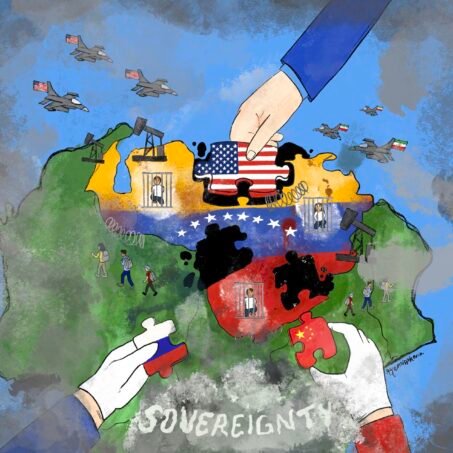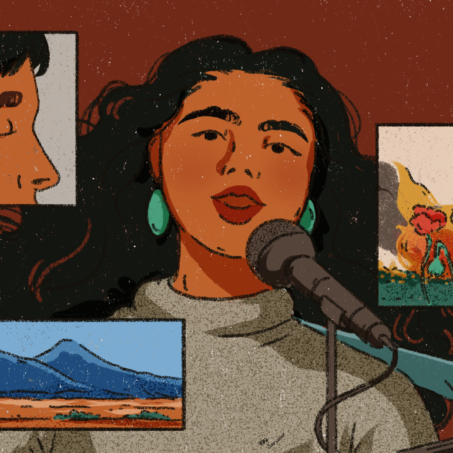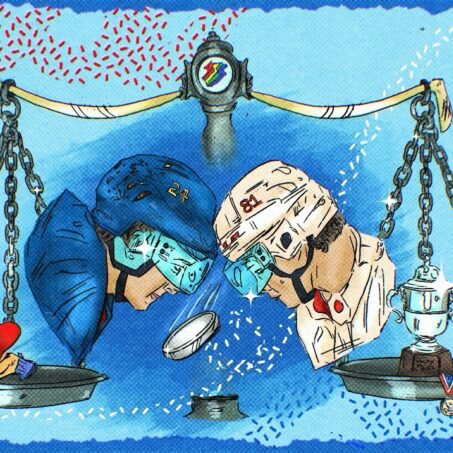La Comuna (the commune) is a community space located in the centre of Mexico City, run by a group of lesbians, trans and queer women, most of whom are independent artists, researchers, producers and activists.
Its walls are covered in murals by local artists and the trans flag hangs proudly. On the ground floor there is a big patio where every Friday, members of the queer community dance to reggaeton, rap, and cumbia music in a safe space where they can be who they choose to be.
Throughout the house you can see posters adorned with political messages: “respect pronouns”, “reproducing life in community is revolutionary”, “loving each other is a way of surviving”, “feminist, queer, and proud”.
Through speaking to the collective I discover that La Comuna not only serves as a space to provide refuge for the LGBTQI+ community in Mexico City, but also as a space from which to organise political resistance.
By confronting issues such as discrimination against lesbian and trans women in Mexico City, violence in romantic relationships between members of the community, and the lack of a support and care system for LGBTQI+ folks in Mexico, La Comuna serves the community within it.
As part of addressing the issues related to the rights of the LGBTQI+ community, La Comuna also supports anti-capitalist and anti-systemic political movements in Mexico, including organisations fighting to free political prisoners.
These spaces are all the more important in environments such as Mexico City, which is plagued by issues such as discrimination, a lack of proper public policies safeguarding LGBTQI+ rights, marginalisation, political repression and violence.
Getting to the heart of La Comuna
I visited La Comuna last month where I had the opportunity to meet several of the members and understand their political views as well as to experience their way of organising and living in community.
As they cook dinner one evening, we talk about the space and what it means for all of them.
The atmosphere is calm but also energetic: everyone has a role, everyone seems to know what they need to do, everyone laughs and shares stories. In line with their ethos on collectivism, they preferred to be referred to as ‘the collective’ for this interview.
I ask them about the story behind the name. “We call this space La Comuna because we believe that the only way to resist and survive this capitalist system is by building and living in a community. We do not believe in taking power and changing the world. Our political proposal is to build the world we want here and now.”
We go on to talk about the difficulties of living in Mexico City, a place which faces increasing living costs, gentrification, and violence against queer people.
In the last five years there have been 257 official cases of trans people murdered in Mexico. However, grassroots organisations claim that this data understates the magnitude of the problem as police in Mexico don’t recognise the murder of trans people as a high-priority issue, and therefore a large number of cases are ignored by authorities.
For members of La Comuna, the space offers an opportunity to support each other economically and emotionally. They work together in times of difficulty and through collective living and working to improve their space together they have become friends and even comrades.
They organise events where they sell products and food they make, in order to cover the costs of rent and living needs for all its community.
“Life in the city is almost impossible – it fragments and individualises people,” they say. “It’s only through mutual support and sharing the workload that we can thrive.”
They continue: “Ours is a political thought that we have learned from other movements, such as the fights of Indigenous communities and the defence of their land. They communally organise to care for each other and reproduce life in all of its forms.”
Survival post pandemic
La Comuna opened in January 2020 as a community kitchen which hosted poetry events. The space was just coming to life when it was stopped in its tracks by COVID-19. Speaking to members of La Comuna, I learn about the hardships they endured to maintain the project during this critical time.
“We had to close the house to the public. Many left and went back to their towns to support their families. Others stayed to resist here; it was a very complicated moment for us.After some months, we re-started the community kitchen but we only had takeaway. We could not compete with platforms like UberEats, and although it allowed us to survive, it was not sustainable, nor did it allow us to continue to grow the project.”
In May 2021, after more than a year of isolation, La Comuna finally reopened its doors. Since then, they have been running a consistent programme of events for the LGBTQI+ community. They also hold workshops on different topics, for example, on electronics, plumbing, political thinking, dancing, poetry and others; members also participate in wider protests and other political events in Mexico City.

Join our mailing list
Sign up for shado's picks of the week! Dropping in your inbox every Friday, we share news from inside shado + out, plus job listings, event recommendations and actions ✊
Sign up for shado's picks of the week! Dropping in your inbox every Friday, we share news from inside shado + out, plus job listings, event recommendations and actions ✊
“We have a shop where local artists and producers can sell their products; we also have a reading and analysis club where we discuss political issues,” they say. There’s also a cinema club, where the members screen queer-produced films, and on Fridays they host a lesbotanero where LGBTQI+ women can gather to eat and dance in a safe space.
And that’s not all. “We also organise events to promote the work of women and queer artists, such as book presentations, poetry readings and rap concerts,” the collective continues. “Through these events we look to open spaces for autonomous artists, as there are no other places for them to promote their work.”
Keeping the boat afloat while maintaining strong principles
Unfortunately, the principles that form the foundation of La Comuna can sometimes inhibit its survival.
Economic stability is one of the main obstacles, as most members are independent artists and researchers, and the events and projects organised internally sometimes do not cover all their living costs.
As La Comuna is also an autonomous space (which means that it does not engage in any way with political parties, the state, or any other organisations) it cannot accept funding from any of these bodies.
“We believe that we are able to achieve everything and reproduce our life through our own means. We don’t want to be dependent on anyone else. Also we know that the relationships between funder and recipient can generate power imbalances that end up taking away agency and independence.”
Because of this, members of La Comuna often have one or two jobs on top of the work they already do within the space.
“The need to take up extra work wears us down and takes us away from the work we do here,” they say. “But we don’t give up. We resist every day and we always find ways to keep this project and its flame alive.”
Part of this resistance is the rejection of capitalism and patriarchy – and the recognition of their codependency.
“Capitalism invented patriarchy,” La Comuna asserts, “so we recognise that the broad struggle of feminism is to attack patriarchy in all its forms; in its racism, its misogyny and in its colonialism. Within patriarchal systems, lesbian women are not recognised, as within patriarchy women are solely at the service of men. For patriarchs there are no other identities other than men and women.”
Capitalism and patriarchy are irreparably interconnected, as it is men who have built the racist and capitalist systems that we live in, where the bodies of women, queer people, Indigenous folk are exploited.
Internal struggles
However, to stay unified across all issues isn’t easy. The collective tells me about the internal struggles that often make organisation more difficult.“We continue to hold on to beliefs and patterns that are violent and toxic to other members of our community,” they admit.
”There is always this habit to put oneself first, as an individual, before the community. Individuality is very anchored in our ways of acting and thinking and that hinders the community process. Living in a community and learning to live together therefore involves a lot of work. We must accept our differences, and that means accepting what we do not like about eachother.”
As a way of facing internal problems, members of La Comuna believe that emotional intelligence is as important as economic stability and political knowledge. Every week, the members of the house hold a space called “the catharsis”, where they talk about their feelings – including any negative feelings they might be holding towards each other.
“We sometimes talk for up to 10 hours about all the negative feelings or misunderstandings between us. It’s a very hard and difficult time in the house, but a very loving one too,” they explain. “We have also learned to say the things that bother us in a loving way and also learned to accept what others tell us.”
Surviving a hateful society towards queer and lesbian bodies
A week before we conducted this interview, La Comuna woke up to a hate message painted on the outside walls of the house. Unfortunately, this is not the first attack against its members.
“We have suffered many hate attacks, where people have painted transphobic and lesbophobic messages on the walls. Nothing ‘serious’ has happened but it reminds us that Mexican society is still very conservative and they are uncomfortable with a space where lesbian women and trans people live freely,” the collective explains.
I ask about their experiences as trans people and lesbian women in Mexico, taking into account that in 2021 alone there were 78 violent deaths of members in the LGBTQI+ community.
According to the collective, although the Mexican media portrays a message of relative openness to the sexually diverse community, in reality, trans people and lesbian women face cruel violence every day.
“In La Comuna we have received women who have been beaten for being lesbians. We have also received trans folk who have been interned in ‘conversion’ centres where they were beaten, locked up, and tortured, just for being trans.”
They argues that there is still a long way to go before trans people and lesbian women are respected and protected in Mexican society.
But, the division between trans-inclusive feminism and trans-exclusionary feminism only exacerbates this and has led to divisions with other collectives, making it harder to build connections outside of La Comuna.
“There are other women who don’t come here because they know that there are also trans people here,” explains a member.
This is an issue experienced in almost every feminist space in Mexico. The divisions between trans-inclusive and trans-exclusionary feminism has paralysed many collectives that are finding it really hard to build a common ground where everyone feels accepted and respected.
La Comuna, however, has refused to use too much of its energy and resources talking about these issues. Instead, they focus on creating strong community principles and working with other movements and collectives that also seek to build autonomous ways of resistance.
“A safe space for everyone”
I end the interview by asking some members of La Comuna what the space means to each of them personally.
They all agree that the house has become a refuge for them and a place where they can be their authentic selves, especially in a city where their existence as trans and lesbian people threatens the conservative values of wider Mexican society.
One of the members who has recently joined La Communa, says: “I have been here for six months and it has been life-changing to be in a space that is like a refuge from the violence that is outside. It has also been a great learning experience to live with other women and trans people. It was a dream for me, and now I am learning to live collectively.”
Another woman in the space agrees that ultimately, it’s a refuge. “It has been a safe space to return to myself and my identity. This is something that’s essential for me, but that out there is not possible. That happens to many people who come here, they realise that in this community you can do other things, and be the person you dream of being.”
Having experienced just a small taste of La Comuna, I can agree that it’s a wholly welcoming space where people feel loved, respected and protected and where, every day, its members fight to create a small world out of the cruelty of the systems we are obligated to live in.
Hopefully, more people can be encouraged by spaces like La Comuna and learn how to live in community and actively work to end patriarchy, racism, colonialism, and hatred towards queer bodies.
What can you do?
Follow the social media accounts of La Comuna to learn more about them and issues relate to the queer community in Mexico.
La Comuna members have also recommend these books:
- Pensar las autonomías. Bajo Tierra Ediciones
- Pensar las autonomías. Experiencias de autogestión, poder popular y Autonomía. Bajo Tierra Ediciones
- Hacer común contra la fragmentación en la ciudad. Mina Lorena Navarro. Benemérita Universidad Autónoma de Puebla
- Rebeldías feministas y luchas de mujeres en América Latina. Bajo Tierra Ediciones
- Identidad-es historia. Feminismos del Abya Yala. Biznaga Ediciones.
Read about other resistance movements in Mexico:
- Indigenous communities in Mexico are confronting narcos and mining by building autonomy – Shado Magazine
- How Nahua Indigenous communities in Mexico took on Danone in defence of water and life – Shado Magazine
- The Caravan in Defence of Water and Life – an overview – Shado Magazine
- Betrayed by the government – but not conquered – Shado Magazine
